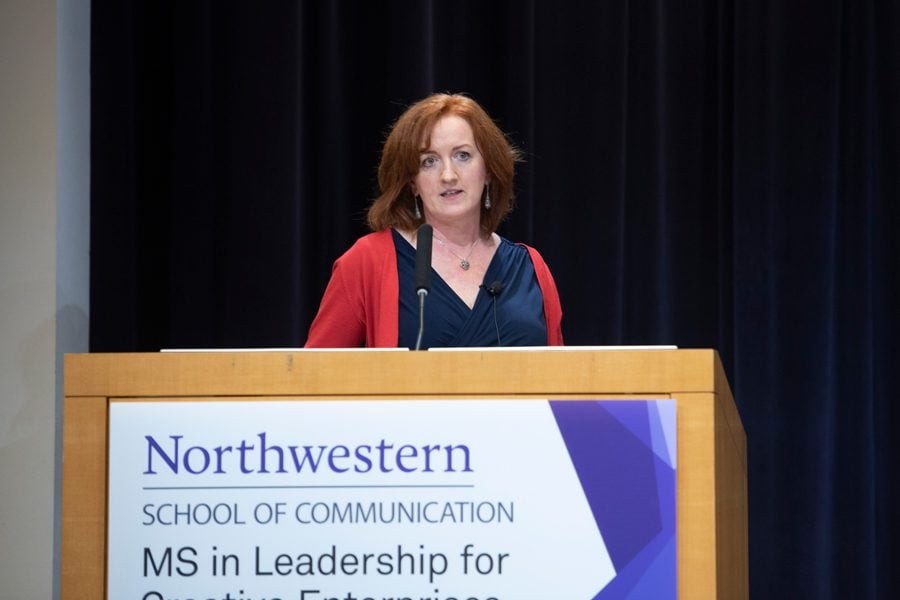Edinburgh Fringe Festival Society chief executive talks charity, arts festivals at MSLCE event
Alison Albelda/The Daily Northwestern
Shona McCarthy speaks on Monday. McCarthy, chief executive of the Edinburgh Fringe Festival Society, spoke about the festival at a Master of Science in Leadership for Creative Enterprises department event.
May 21, 2018
When Shona McCarthy describes the Edinburgh Fringe Festival, she repeats a mantra: Don’t talk about the size, don’t talk about the numbers.
But McCarthy, the chief executive of the Edinburgh Fringe Festival Society, went against that mantra for a few minutes during her Monday talk, emphasizing the annual audience of about 4.5 million people, on par with the FIFA World Cup and short of only the Olympic Games.
At an event hosted by the Master of Science in Leadership for Creative Enterprises department — held at the McCormick Foundation Center Forum — she said journalists only asked her about the number of vendors at the festival during her first news conference as chief executive.
“That was literally what the story had become,” she said. “So it really kind of brought home to me that the first way that I could add value was to remind people of the starting point of this festival and what it was really about. And this isn’t just a festival. This is a platform for creative freedom, for freedom of expression.”
According to its website, the festival was founded after eight theater groups showed up uninvited to the Edinburgh International Festival. Since the groups weren’t invited, they performed on the “fringe” of the festival, which eventually led to the formation of the Fringe Festival Society.
Jennifer Novak-Leonard, director of the MSLCE department, said she was “thrilled” to bring McCarthy to Northwestern. The talk was part of an ongoing series.
“The speaker series is an opportunity for the rising professionals within the program, members of the broader Northwestern community, as well as members of the broader Chicago area … to connect with innovative and influential thinkers,” she said.
After speaking for roughly 40 minutes to a crowd of about 70 people, McCarthy participated in a moderated Q&A session with Novak-Leonard and then an open Q&A with audience members. She answered questions about the festival’s corporate relations, its cost and its future.
McCarthy said the cost to perform at the festival has been fixed for a while, adding that the festival recently decided cost would not rise for at least the next five years. However, she noted that costs for travel and accomodations have increased, which can make it difficult for some people to attend the festival.
Katrina Herrmann, who works as a stage manager in the Chicago area, said she’s attended multiple events in the speaker series. She said she was interested in learning more about the arts.
“It’s really important that she said, ‘You can do great things if you don’t care who gets the credit,’” she said. “I have also found that, in my own experience, that if you’re willing to let your ego go, more things get done and you don’t waste time on blame and you don’t waste time on credit.”
At the end of her initial speech, McCarthy said she is passionate about leading the festival society every day.
“We believe in the power of arts and creativity to connect, to create empathy, to explain, to unravel, to give new eyes to all problems, to give voice and to tackle difficult subjects in illuminating ways,” she said. “That’s what I believe, that’s why I’m there, that’s why I love my job.”
Email: [email protected]
Twitter: @thejonahdylan


